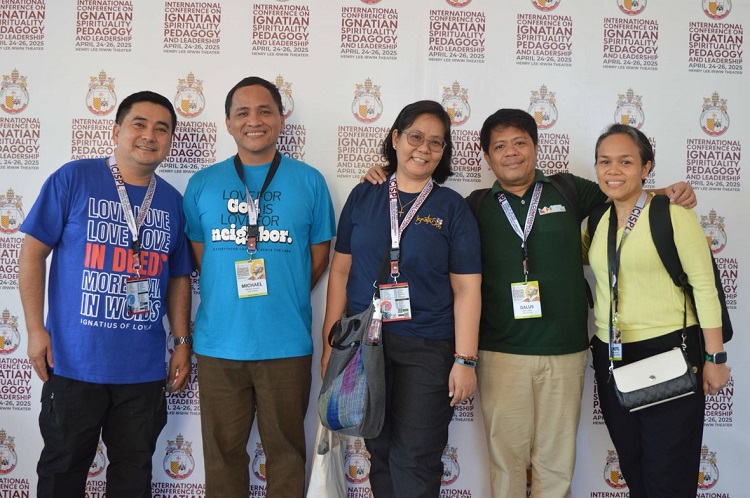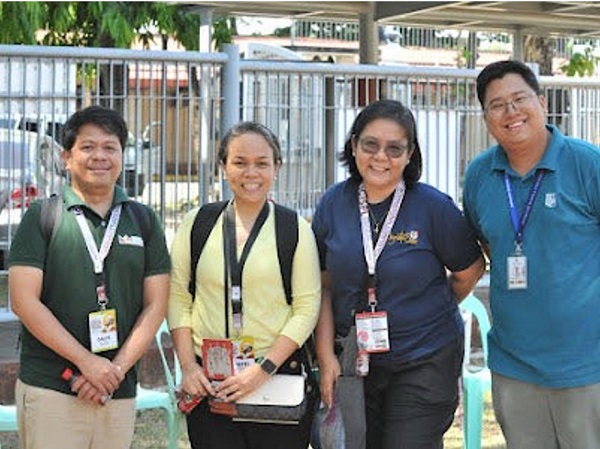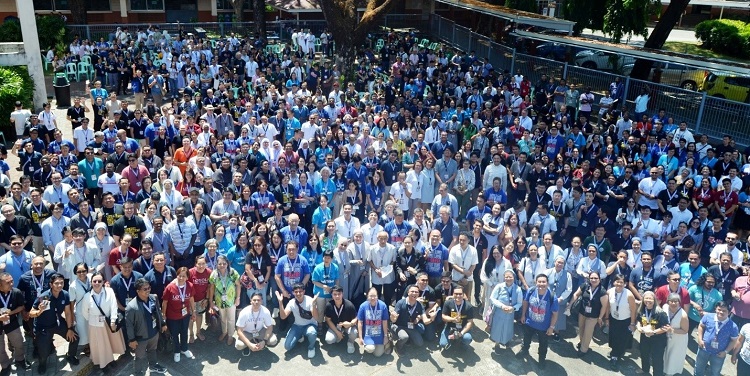
Photo courtesy of the International Conference on Ignatian Spirituality, Pedagogy, and Leadership organizers.
The International Conference on Ignatian Spirituality, Pedagogy, and Leadership, held from 24 to 26 April 2025 at the Henry Lee Irwin Theater of Ateneo de Manila University, brought together a rich tapestry of educators, pastoral workers, administrators, and Ignatian collaborators from across the globe. Anchored on the foundational elements of Ignatian Spirituality, the conference sought to reawaken the inner call for meaning, mission, and transformative action through the pillars of spirituality, pedagogy, and leadership—elements that continue to shape Jesuit education and form persons committed to faith, justice, and service.
This three-day gathering guided participants through a spiritual and intellectual journey that began with a return to the heart of Ignatian Spirituality. It emphasized nurturing a personal relationship with God as the wellspring of mission. From this foundation, the conference explored the evolving dimensions of Ignatian Pedagogy in the 21st century, focusing on the dynamic interplay of reflection and action in the teaching-learning process. These insights then culminated in reflections on leadership—the kind that is not merely managerial but deeply rooted in spiritual discernment, compassionate engagement, and transformative service.
Xavier University – Ateneo de Cagayan was well-represented in this momentous gathering, with formators and leaders from the university’s various mission offices participating in the sessions and dialogues. Among the attendees were Ms Marie Raine Alamban and Mr Arniel Daluz from the Xavier Formation Program; Dr Junefel Macagba, Assistant to the Vice President for Mission and Ministry; Dr Danikka Rose Fabela, Mr Michael Acenas, and Dr Omar Mitchelle Tan from the Hed Campus Ministries Office; and Ms Quirra Lastimosa from the Senior High School Campus Ministry Office. Their presence reflected Xavier Ateneo’s continuing commitment to deepening its Ignatian identity and forming leaders grounded in spirituality and service.
Keynote presentations offered the backbone of the conference, beginning with Fr Ramon L Bautista, SJ, who offered a compelling reflection on the Spiritual Exercises of St Ignatius, reminding participants that all meaningful leadership begins with inner transformation. Fr Jose Quilongquilong, SJ, invited attendees into a deeper understanding of vocation and communal discernment, highlighting the need to constantly listen to God’s invitation in daily life. Fr Michael Rossmann, SJ, captivated the audience with his insights on digital spirituality, showing how Ignatian principles can thrive in digital platforms and modern communication spaces.
On the second day, Fr Johnny C Go, SJ, delivered his timely and provocative talk titled “Learning is an Endangered Species: Refractive Learning in the Age of AI.” In this session, Fr Go emphasized that true learning today demands more than knowledge acquisition; it requires cultivating the inner capacitiesof reflection, discernment, and wisdom. He warned that in a time of overwhelming information and algorithmic thinking, we risk losing the essence of learning unless we re-anchor education in human formation. He urged educators to raise students who are not only competent but also contemplative and compassionate—capable of navigating complexity with groundedness and grace. Ms Ma Rita Atienza introduced the model of “Learning by Refraction,” a compelling development of the traditional Ignatian Pedagogical Paradigm. Her approach encouraged educators to move from reflection into meaningful reframing and responsible action.

Photo courtesy of the International Conference on Ignatian Spirituality, Pedagogy, and Leadership organizers
Complementing the keynote addresses were breakout sessions that invited participants into deeper experiential learning. These workshops ranged from practices in spiritual direction and communal discernment to strategies for interfaith dialogue, ecological engagement, and classroom innovation grounded in Ignatian values. Among the most appreciated were sessions on Reflective Classroom Design, Ignatian Critical Thinking, and EdTech for Mission—each offering practical ways to infuse Ignatian pedagogy into contemporary learning spaces.
The final day of the conference turned toward leadership in a Church that journeys with and listens to all. Fr Karel San Juan, SJ, offered a profound synthesis in his talk on Ignatian Wisdom for Leadership in a Synodal Church, where he emphasized that true leadership is humble listening, shared mission, and faithful discernment. He invited participants to consider leadership as a communal pilgrimage—one that embraces uncertainty with courage, builds consensus through dialogue, and remains rooted in the Spirit’s movements. His reflections were followed by a thought-provoking and humorous yet deeply meaningful concluding talk, “Kool Aid or Coke Light?”: Challenges for Catholic Leadership” by Fr Johnny C Go, SJ, which invited leaders to reflect on authenticity, depth, and the temptation to settle for surface-level branding over substance. It was a wake-up call for Catholic educators and leaders to remain critically grounded, spiritually nourished, and courageously prophetic in an increasingly secularized and consumerist world.
For the Xavier Ateneo delegates, the conference served as both an affirmation of the work already being done within the university and an invitation to deepen and broaden it. Dr Macagba shared that the conference affirmed the importance of rooting leadership in Ignatian Spirituality—recognizing that effective leadership stems not from status or strategy, but from an interior life anchored in God’s call. Personally, I came away with a deeper appreciation that Ignatian Spirituality is not merely about breadth, but about depth. The principle of Non Multa Sed Multum—not many things, but much in depth—resonated strongly throughout the conference, particularly in how it shaped our engagement with each session.
What made this conference uniquely transformative was its character not only as an academic gathering, but as a prayerful encounter. The entire program was thoughtfully patterned after the Ignatian Pedagogical Paradigm, with each part inviting not just intellectual stimulation but spiritual internalization. Daily pauses for Consciousness Examen allowed participants to process what they learned not just in the mind, but in the heart. These sacred moments helped internalize key insights, foster openness to God’s invitations, and inspire meaningful action grounded in faith.

Photo courtesy of the International Conference on Ignatian Spirituality, Pedagogy, and Leadership organizers.
As the conference drew to a close, participants were reminded that their journey was not ending but just beginning. In a spirit of missioning, they were sent forth to bring back the fire of Ignatian spirituality, pedagogy, and leadership to their respective institutions. For Xavier Ateneo, this fire burns even brighter, igniting hearts and shaping minds toward the greater glory of God.